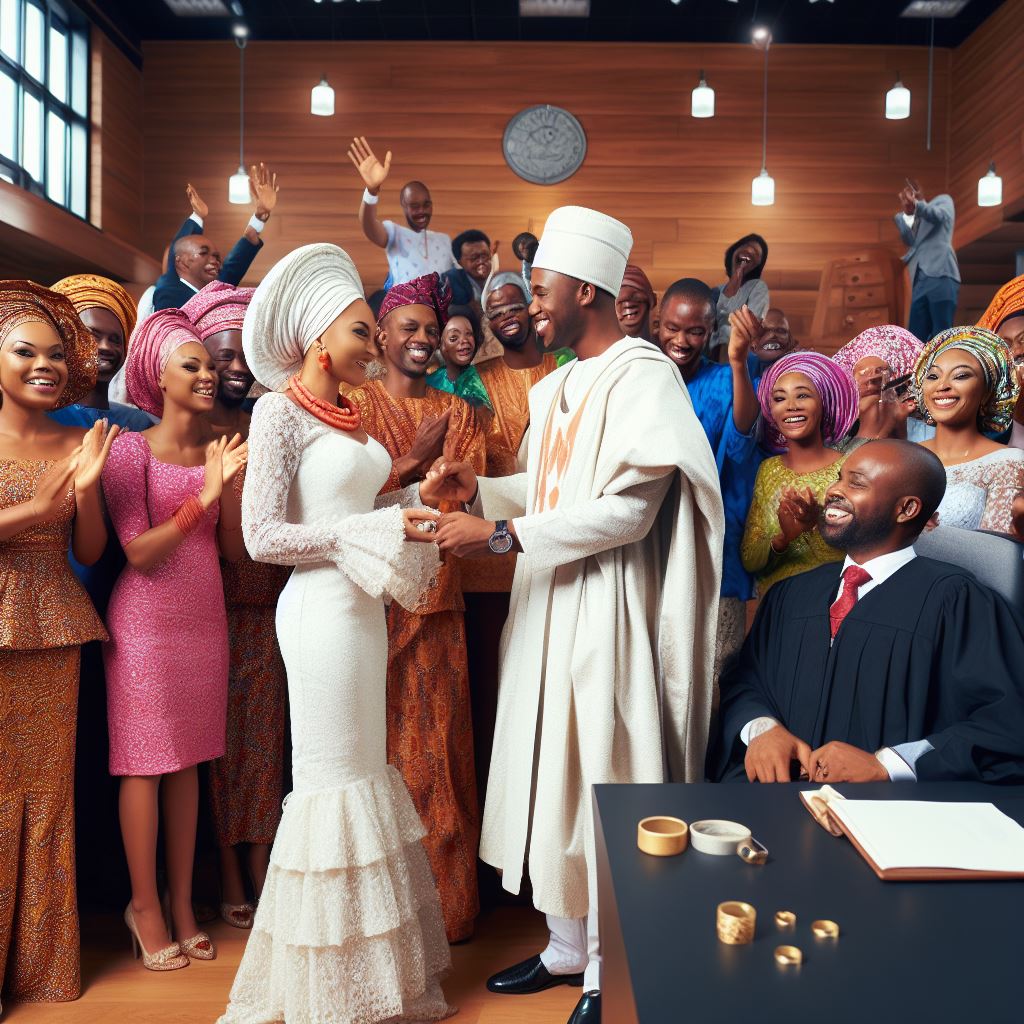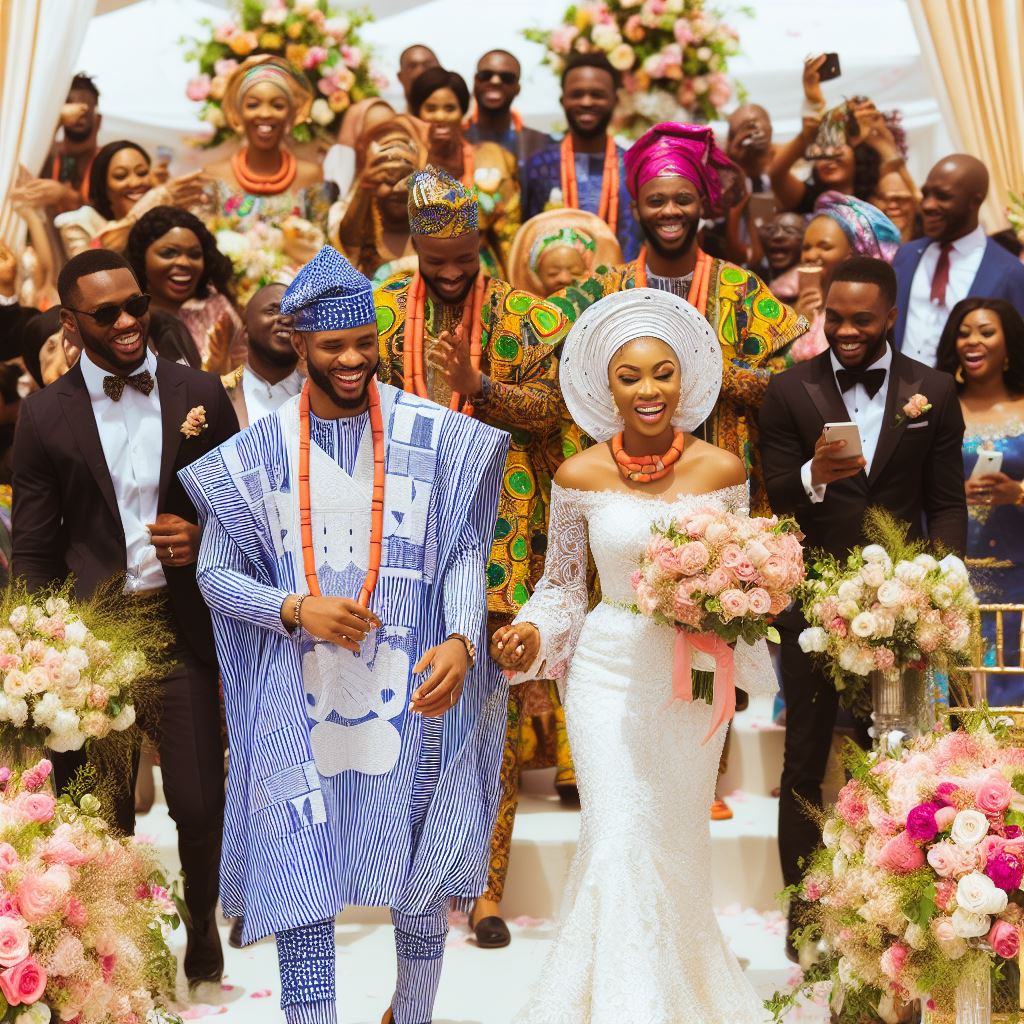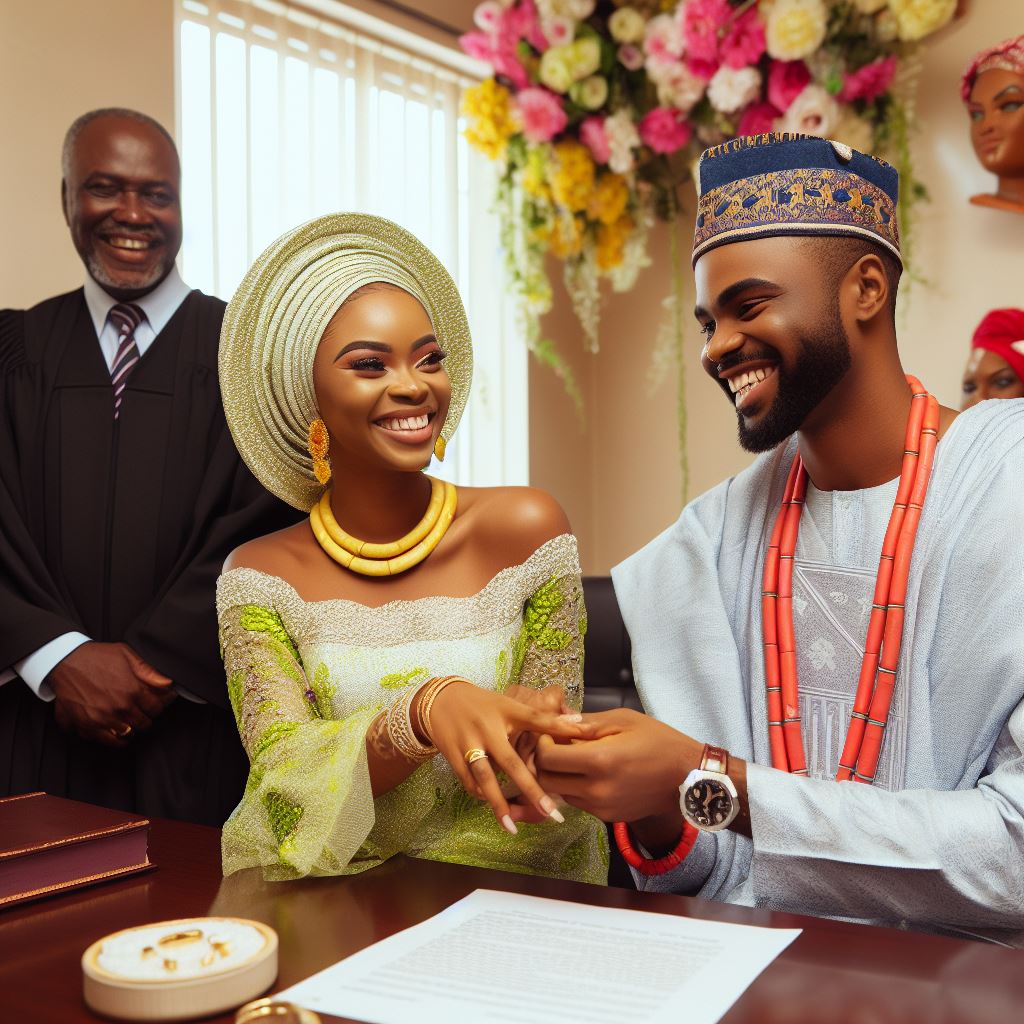Introduction
In Nigeria, the Nigeria Marriage Act elevates marriage to more than a mere union; it enshrines it as a cherished institution intricately woven into the nation’s cultural fabric.
It serves as the foundation for family and community development.
As such, it is vital to comprehend Nigeria’s marriage act to ensure legal compliance and protect the rights of individuals involved.
Importance of understanding Nigeria’s marriage act
The importance of understanding Nigeria’s marriage act cannot be overstated.
It offers individuals a detailed guide on following legal requirements, procedures, and obligations when entering a marriage contract.
By familiarizing themselves with the act, individuals can make informed decisions and safeguard their rights and interests.
Moreover, understanding the marriage act helps couples navigate the complex legal landscape should issues arise during the course of their marriage.
This knowledge enables them to seek legal remedies and protect themselves from potential abuses or violations of their rights.
Additionally, understanding Nigeria’s marriage act is beneficial for those seeking to dissolve their marriage.
It outlines legal grounds and procedures for divorce, ensuring a smooth, lawful process.
Basically, a comprehensive understanding of Nigeria’s marriage act is essential for anyone intending to enter into or dissolve a marriage in Nigeria.
It serves as a crucial tool for legal compliance, protection of rights, and the preservation of the cultural institution of marriage.
By familiarizing oneself with the act, individuals can navigate the complexities of marriage law and ensure their rights are upheld.
Historical Background of Nigeria’s Marriage Act
Beginnings of the Marriage Act in Nigeria
Nigeria’s Marriage Act has its roots in the colonial period during British rule.
The Act was introduced to regulate marriages and ensure legal validity.
It aimed to harmonize marriage laws across different regions and ethnic groups in Nigeria.
The Marriage Act was first enacted in 1914 as part of the laws applicable in Nigeria.
It consolidated previous laws and customary practices related to marriage.
Key milestones and amendments over the years
- The Marriage Act underwent significant amendments to adapt to the changing needs of Nigerian society.
- In 1933, the Act was amended to allow the registration of customary marriages.
- This amendment recognized the importance of customary marriages in Nigerian culture.
- In 1970, amendments were made to align the Marriage Act with the Nigerian Constitution.
- These changes aimed to protect the rights of individuals in marriage and promote equality.
- Subsequent amendments in 1990 and 1996 further strengthened the Act’s provisions.
- The amendment in 1990, for example, clarified the legal requirements for marriage registration.
- The 1996 amendment introduced the option of a statutory marriage declaration.
- This declaration allowed couples to choose between a religious or civil marriage ceremony.
- The most recent amendment to the Marriage Act was in 2004, which aimed to address issues of child marriage.
- It increased the minimum age of marriage and established penalties for those involved in underage marriages.
- These milestones and amendments demonstrate the evolving nature of Nigeria’s Marriage Act.
Generally, the historical background of Nigeria’s Marriage Act reflects the country’s efforts to provide a legal framework for marriages that accommodates diverse cultural and religious practices.
Authorities continuously amend the Act to tackle evolving challenges and safeguard marriage participants’ rights.
By understanding the historical context of the Marriage Act, individuals and couples can navigate the legal requirements and rights associated with marriage in Nigeria.
Read: The Role of Faith in Upholding a Sanctified Marital Relationship
Essential Requirements for a Valid Marriage
Legal age requirement for marriage
- Both parties must be at least 21 years old to legally enter into marriage.
- Marrying individuals below the age of 21 requires parental or guardian consent.
Consent and capacity of parties involved
- Both parties must give their express consent to enter into the marriage.
- They must have the mental capacity to fully understand the implications of marriage.
- Individuals with severe mental disabilities may require a legal representative to provide consent on their behalf.
Factors influencing prohibited marriages
- Marriage between close relatives, such as siblings or parents and children, is strictly prohibited.
- Marriage to someone already in a legally recognized marriage, known as bigamy, is not allowed.
- Consanguinity, which refers to blood relations, and affinity, which refers to in-law relationships, can also influence prohibited marriages.
Registration and certification process
- Marriages must be registered with the appropriate government authorities within three months of the wedding ceremony.
- Both parties must provide valid identification documents, such as birth certificates or passports, during the registration process.
- All necessary forms and fees must be submitted to obtain a marriage certificate.
- The marriage certificate serves as legal proof of the marriage and may be required for various official purposes.
- Obtaining multiple copies of the marriage certificate is advisable for future needs.
Meeting the essential requirements for a valid marriage in Nigeria is crucial to ensure the legality and legitimacy of the union.
By adhering to these requirements, couples can avoid potential issues and complications in the future.
Consult legal professionals or marriage registrars to grasp specific requirements and procedures tailored to your circumstances.
Read: Advice for Newlyweds: Navigating the Journey with Hebrews 13:4
Types of Marriages Recognized under Nigeria’s Marriage Act
Customary/Traditional Marriages
Customary or traditional marriages are recognized under the Nigeria Marriage Act.
These marriages are conducted according to the cultural practices and traditions of the ethnic groups in Nigeria.
1. Requirements for Customary/Traditional Marriages
- Consent of both parties is essential.
- Payment of bride price or dowry.
- Performance of traditional rites and ceremonies.
- Participation of families and elders in the marriage process.
2. Validity of Customary/Traditional Marriages
- Customary marriages are considered valid once all the required rites and ceremonies have been performed.
- Registration of the marriage with the appropriate authorities is also important to establish legal recognition.
Statutory/Christian/Islamic Marriages
Statutory, Christian, and Islamic marriages are also recognized under the Nigeria Marriage Act.
These marriages follow the guidelines set by the Marriage Act.
1. Requirements for Statutory/Christian/Islamic Marriages
- Consent of both parties is necessary.
- Prior notice of the intention to marry must be given at the marriage registry.
- Presentation of valid identification documents.
- Witness signatures are required.
- Performance of religious rites and ceremonies, depending on the faith.
2. Validity of Statutory/Christian/Islamic Marriages
- Statutory, Christian, and Islamic marriages are considered valid once all the legal requirements are fulfilled.
- Marriage certificates are issued as evidence of the marriage.
Monogamy and Polygamy
The Nigeria Marriage Act recognizes both monogamous and polygamous marriages, based on the religious and cultural beliefs of the individuals involved.
1. Monogamy
- In monogamy, an individual legally marries only one spouse at a time.
- It is the prevailing form of marriage in Nigeria, particularly in urban areas.
2. Polygamy
- In polygamy, a person actively marries multiple spouses simultaneously under the law.
- Certain ethnic groups commonly practice this, influenced by their religious and cultural traditions.
3. Legal Regulations for Polygamy
- The Nigeria Marriage Act actively regulates polygamy, imposing limits and stipulating requirements for these unions.
- The Act stipulates that a man must obtain a court’s permission to marry multiple wives and must meet certain conditions, including financial capability.
Essentially, Nigeria’s Marriage Act recognizes different types of marriages, including customary/traditional marriages, statutory/Christian/Islamic marriages, and both monogamy and polygamy arrangements.
Each type of marriage has specific requirements and validations under the law.
Understanding these different forms of marriages is essential for individuals planning to marry or seeking legal recognition of their marital status in Nigeria.
Read: Nigeria’s Traditional Marriages and The Biblical ‘Honourable’ Union

Rights and Duties of Spouses
Property rights and ownership
- Spouses have equal rights to property acquired before or during the marriage.
- Both partners can own property individually or jointly based on their preferences.
- The law recognizes the importance of equitable distribution of property in case of divorce or death.
Inheritance and succession rights
- Spouses have the right to inherit each other’s property in the event of death.
- The law entitles the surviving spouse to a portion of the deceased partner’s estate.
- These inheritance rights provide financial security and support for the surviving spouse.
Obligations towards each other
- Spouses have a duty to support and care for each other emotionally and physically.
- They should respect and prioritize each other’s well-being and happiness.
- Mutual understanding, cooperation, and communication are essential for the success of the marriage.
Maintenance and financial responsibilities
- Both spouses are responsible for the financial well-being of the family unit.
- They should contribute proportionately to the household expenses based on their income.
- In case of divorce or separation, the court may order one spouse to pay alimony or child support.
In general, the Nigerian Marriage Act acknowledges the rights and duties of spouses in various aspects.
Regarding property rights and ownership, both partners are equal owners and have the right to enjoy and distribute property.
In terms of inheritance and succession rights, spouses have the legal entitlement to inherit each other’s assets after death.
This ensures financial security for the surviving spouse.
Obligations towards each other include emotional and physical support, respect, and mutual understanding.
Lastly, both spouses have a shared responsibility for the financial well-being of the family, including contributing to household expenses.
These provisions aim to foster healthy and equitable relationships between spouses in Nigeria.
Read: Benefits of a God-Centered Marriage: Insights from Hebrews 13:4
Dissolution of Marriages
Grounds for Divorce
In Nigeria, the Marriage Act recognizes various grounds for divorce:
- Adultery: If either spouse engages in extramarital affairs, it’s a valid reason for divorce.
- Desertion: When one partner abandons the other for at least two years without justifiable reason.
- Cruelty: Divorce can be sought if a spouse endures physical or mental cruelty.
- Incurable Insanity: If a spouse is declared legally insane for a continuous period of at least five years.
- Wilful Neglect: Abandoning financial responsibilities can be a ground for divorce.
- Infectious Disease: If a spouse contracts a communicable disease like HIV, divorce is permissible.
Legal Procedures for Divorce or Annulment
To initiate divorce proceedings in Nigeria, follow these steps:
- Filing a Petition: One spouse files a divorce petition, stating the grounds.
- Serving the Petition: The other spouse is served with the divorce papers.
- Defending the Petition: The served spouse can respond within eight days.
- Hearing: Both parties present their case in court, and witnesses may be called.
- Decree Nisi: If the court grants the divorce, a conditional order is issued.
- Decree Absolute: After six weeks, the final divorce decree is granted.
Consequences and Implications of Divorce
Divorce in Nigeria has significant implications:
- Property Division: Assets are divided equitably, considering both parties’ contributions.
- Child Custody: Custody arrangements are decided in the best interests of the child.
- Maintenance Orders: Spousal support may be ordered if one spouse is financially disadvantaged.
- Remarriage: Both parties are free to remarry after obtaining the decree absolute.
- Emotional Impact: Divorce can lead to emotional distress for both spouses and any children involved.
- Social Stigma: In some communities, divorce may carry social stigma, impacting reputations.
Understanding Nigeria’s Marriage Act regarding divorce is crucial, as it ensures a fair and just process for all parties involved.
Challenges and Controversies Surrounding Nigeria’s Marriage Act
Clash between traditional and statutory marriage systems
Traditional marriage practices often conflict with the legal requirements set forth by the Marriage Act.
The clash between these two systems can lead to confusion and legal discrepancies.
Traditional customs may not adhere to the formal procedures outlined in the Marriage Act.
Disputes can arise when couples try to validate their marriages under both traditional and statutory laws.
The lack of clarity and consistency between these two systems creates challenges for individuals and legal authorities.
Gender disparities and inequalities
- The Marriage Act perpetuates gender disparities by giving men certain advantages in marriage.
- The Act still recognizes polygamy, allowing men to have multiple wives, while women can only have one husband.
- The Act also emphasizes the authority of the husband, giving him control over marital property and decision-making.
- This creates an unequal power dynamic within marriages and reinforces traditional gender roles.
- Women’s rights activists argue for more gender equality provisions within the Marriage Act to address these disparities.
Impact of modernization and globalization on marriage practices
- Modernization and globalization have influenced Nigerian marriage practices, often challenging traditional norms.
- The introduction of new cultural ideas and practices from other cultures can clash with traditional customs.
- Western influences, such as the emphasis on individualism, have led to changes in expectations within marriages.
- Couples now seek more egalitarian relationships and question traditional gender roles.
- This clash between traditional and modern values creates controversy and debates over the interpretation and application of the Marriage Act.
In essence, Nigeria’s Marriage Act faces challenges and controversies related to the clash between traditional and statutory marriage systems, gender disparities and inequalities, and the impact of modernization and globalization on marriage practices.
These challenges highlight the need for a comprehensive review of the Marriage Act to ensure gender equality, protect individuals’ rights, and address the evolving dynamics of marriage in Nigeria.
Conclusion
Recap of key points discussed in the blog post
Throughout this blog post, we have covered various important aspects of Nigeria’s Marriage Act.
We outlined the requirements for a valid marriage, such as age restrictions, consent, and the need for registration.
We also delved into the different types of marriages recognized by the Act, including civil, customary, and Islamic marriages.
Additionally, we discussed the consequences of non-compliance with the Act, such as the invalidation of marriages and potential legal issues.
Importance of understanding Nigeria’s Marriage Act
“Anyone intending to marry in Nigeria must fully grasp the Marriage Act.”
Individuals, by acquainting themselves with the Act’s provisions, can legally recognize their marriage and prevent future disputes.
Understanding the Act will also help couples make informed decisions regarding their marriage ceremony and ensure compliance with the law.
Encouragement to seek professional legal advice when navigating marriage laws in Nigeria
We highly recommend individuals to seek professional legal advice when navigating Nigeria’s Marriage Act due to its complexity and potential consequences for non-compliance.
A knowledgeable lawyer will clarify Act intricacies and guide individuals through Nigerian marriage legal processes.
This guidance is particularly crucial for individuals from different countries or ethnic backgrounds, as they may have additional legal considerations to address.
In Nigeria, anyone intending to marry must understand the Marriage Act’s vital provisions.
By following the Act’s provisions and seeking legal advice, individuals can ensure a legally valid and hassle-free marriage experience in Nigeria.




